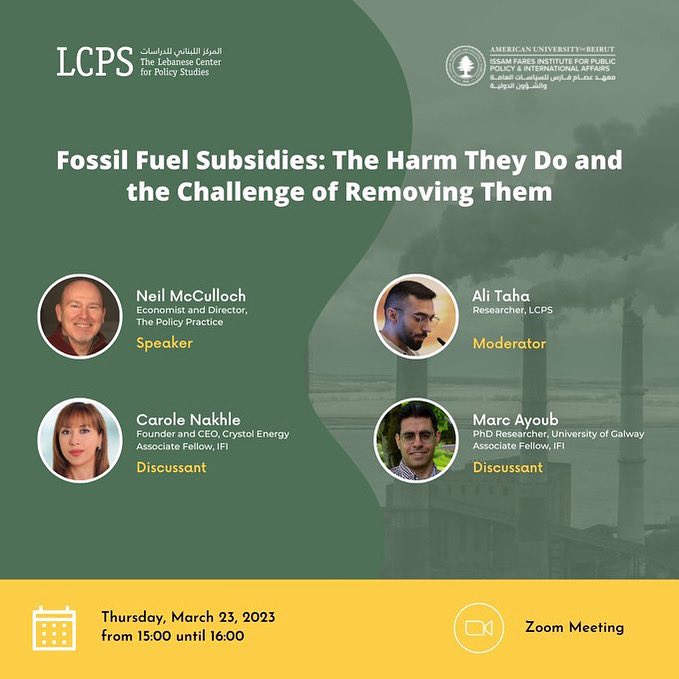|
IFI and The Lebanese Center for Policy Studies (LCPS) hosted a webinar on “Fossil Fuel Subsidies: The Harm They Do and the Challenges of Removing Them” on March 23. The webinar tackled the persistence of fossil fuels in the world, their negative impact on the environment, and the societal and political challenges that arise from removing them. The webinar featured Neil McCulloch, Economist and Director of The Policy Practice, with IFI Associate Fellows Carole Nakhle and Marc Ayoub as discussants, and moderated by Ali Taha, Researcher at LCPS. Neil McCulloch presented an overview on fossil fuel subsidies based on his recently published book “Ending Fossil Fuel Subsidies: The Politics of Saving the Planet.” He explained that fossil fuels subsidies came in two types: consumption and production subsidies. McCulloch highlighted that fossil fuels subsidies were still substantive, as more than USD 1 trillion in subsidies was disbursed in 2022 worldwide. The subsidies were the main cause of climate change, outdoor air pollution, and societal inequality. Despite all their negative impact, he believes they still persist because subsidy reforms make energy more expensive and feed into inflation. Also, countries with limited institutional capacity find it easier to deliver cheap energy than other effective services in education or infrastructure. In addition, if fossil fuel prices were to increase, they would mobilize government opposition against the current ruling system. To conclude his presentation, McCulloch advanced six lessons that can be learned from reformers: (1) reducing subsidies is not a technical problem, but a political one that requires a political solution; (2) governments should build trust with the population to achieve reforms; (3) governments must tackle corruption by protecting and compensating the poor; (4) governments should not just offer compensation, but offer their people a better alternative to the current subsidy; and (5) effective reforms must be accompanied by extensive communication campaigns.
Carole Nakhle highlighted three main ideas on fossil fuel subsidies. Initially, subsidies were supposed to benefit the poor, but ironically, rich people ended up benefitting from them. The poor, who needed them the most, benefitted from them the least, raising the issue of equity and fairness. However, once subsidies were in place, they were very hard to remove because countries got used to them and found it difficult to let them go. In addition, fossil fuel subsidies led to a clash between economic rationale and political interests and realities. This is why these subsidies were not exclusive to developing countries, but also included developed countries such as the G7. Finally, Marc Ayoub focused on subsidies in Lebanon. He mentioned that they were removed in 2021 because of the economic collapse and the loss of citizen trust in public institutions. Subsidy removal came at a time when Lebanese citizens were facing several problems, such as the devaluation of the currency, the banking crisis, and the shortage in food, electricity, and medical supplies. However, people accepted it because they had no other choice. He argued that subsidy removal and the massive hike in diesel prices were not a reasonable way to deal with fossil fuel subsidies. The Lebanese government failed to compensate its people in return for subsidy removal, unlike other MENA countries. You can watch the full recording of the webinar here. Comments are closed.
|
Archives
July 2024
|

